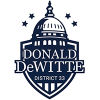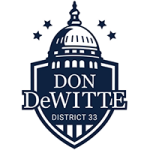By State Senator Donald DeWitte, and
State Representative Ryan Spain
![]() When the Legislature approved the Illinois Future of Work Task Force (FWTF) last year, lawmakers created a framework that allowed stakeholders to work collaboratively to assess the current realities of the state’s economy and labor market amid the ongoing COVID-19 pandemic, and identify future trends and practices to address the challenges businesses and workers face. The overall charge of the committee was to identify policies and practices that will help businesses, workers, and communities thrive economically throughout the state. As the Senate and House Republican appointees to the 35-member task force, we looked forward to a comprehensive and robust exchange of ideas as we examined data and created a list of recommended policy proposals.
When the Legislature approved the Illinois Future of Work Task Force (FWTF) last year, lawmakers created a framework that allowed stakeholders to work collaboratively to assess the current realities of the state’s economy and labor market amid the ongoing COVID-19 pandemic, and identify future trends and practices to address the challenges businesses and workers face. The overall charge of the committee was to identify policies and practices that will help businesses, workers, and communities thrive economically throughout the state. As the Senate and House Republican appointees to the 35-member task force, we looked forward to a comprehensive and robust exchange of ideas as we examined data and created a list of recommended policy proposals.
 The FWTF final report was released on May 31, and along with the task force’s findings, a total of 58 policy proposals emerged. While there are aspects of the report that we support, we are extremely disappointed that the process became fractured, and in the end, excluded legitimate and vital concerns expressed by this state’s most prominent business groups, which include the Illinois Chamber of Commerce, the Chicagoland Chamber of Commerce, the Illinois Manufacturers’ Association, the Illinois Retail Merchants Association, the Mid-West Truckers Association, and the Illinois Farm Bureau. Together, these groups represent thousands of businesses employing millions of Illinoisans. Because their voices were ignored, we joined nearly every pro-business representative on the task force in voting against the ratification of the final report.
The FWTF final report was released on May 31, and along with the task force’s findings, a total of 58 policy proposals emerged. While there are aspects of the report that we support, we are extremely disappointed that the process became fractured, and in the end, excluded legitimate and vital concerns expressed by this state’s most prominent business groups, which include the Illinois Chamber of Commerce, the Chicagoland Chamber of Commerce, the Illinois Manufacturers’ Association, the Illinois Retail Merchants Association, the Mid-West Truckers Association, and the Illinois Farm Bureau. Together, these groups represent thousands of businesses employing millions of Illinoisans. Because their voices were ignored, we joined nearly every pro-business representative on the task force in voting against the ratification of the final report.
The COVID-19 pandemic led to fundamental shifts across numerous sectors of Illinois’ economy in how business is conducted, how businesses interact with customers and clients, and how businesses engage, operate, and build their workforces. Task force members had a responsibility to look at all aspects of the workforce, and formulate policy recommendations that address every sector of the economy; not just those that advance a specific political agenda.
The task force had a responsibility to be transparent when conducting business and to provide ample opportunities for public participation. Unfortunately, many of the task force’s processes were flawed, making it nearly impossible for interested stakeholders to participate. Additionally, meetings were held prior to appointments being made, task force staff met with organizations outside of the process, and ideas proposed by outside groups found their way onto task force agendas. All of these actions undermined the credibility of the panel.
We are equally concerned about the handling of administrative support for the task force. Illinois Public Act 102-0645 expressly states that administrative support (creation of agendas, arranging individuals to provide testimony, etc.) for the Future of Work Task Force is the responsibility of the Department of Commerce and Economic Opportunity (DCEO), yet in reality the role was designated outside of DCEO and included two registered, progressive lobbyists that had a stake in the outcomes. DCEO did not have the authority to circumvent and delegate their statutory requirement for providing administrative support.
We are also disappointed that of the 58 policy recommendations that found their way into the final report, the vast majority of them were never discussed at a task force meeting, and were never voted on by the task force members. Backroom conversations are no way to craft policy recommendations that will be delivered to the General Assembly members who will believe the proposals were properly vetted by the 35 members of the task force.
We do not deny that many of the recommendations are items we would have supported had they come before the task force through proper channels. But as it stands, how are we supposed to implement beneficial reforms when the state’s largest pro-business organizations’ concerns were not taken seriously and were largely omitted from the final report? For all of these reasons, we believe the final task force report should not be considered a valid starting point for public policy discussions in the General Assembly.

